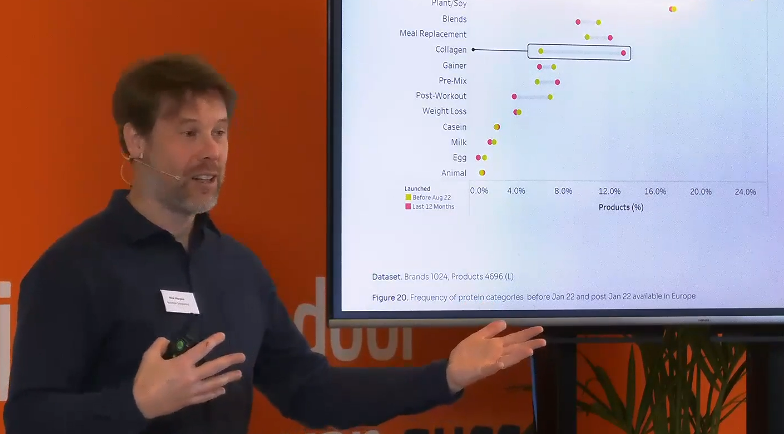
What does sports nutrition look like in 2023?
In the ever-evolving landscape of sports nutrition, we are witnessing a dynamic mix of trends, challenges, and exciting possibilities. Morgan says muscle-building and protein consumption first began to gain visibility with the rise of bodybuilding during the 1950s and 60s. In the decades since, the science of sports nutrition has grown rapidly – and so has the market. Morgan identifies five key product categories within the current market:

While nutrition solutions for elite athletes remain a critical segment, there is a noticeable shift in focus across the sports nutrition market to the time outside of training—or the other 22 hours in the day: products that contribute to performance and health throughout the day are gaining ground. For instance, in the 'lifestyle' segment, these products are increasingly empowering consumers to choose healthier products within their daily routines. More and more people are opting for products with specific functional benefits.
Feeling better, looking better
Morgan underscores the 'aesthetic' drive among many active consumers. The ambition to be faster, stronger, or fitter often stems from a desire to look better and healthier. One simple reason for this shift is that the tangible goal of looking and feeling healthier resonates more with consumers than the abstract goal of enhancing performance levels. Many consumers can easily picture themselves achieving their dream body, as the rise of ‘before and after’ pictures on social media proves. However, the idea of performing on a level like that of the Tour de France or some other high-profile sports event seems beyond reach and therefore is less of a motivator.
Which top trends are driving growth in sports nutrition?
Taking a closer look at popular trends across the industry, Morgan highlights several specific ones:
- Memorable experiences
This trend is all about providing consumers with indulgent products that offer something unique and memorable. This means more than just taste: it's about the overall experience. A contributor to this trend that cannot be ignored is the role of social media: products need to be Instagram-able or TikTok-able, ready for consumers to share with friends. - Engineered naturalness
While consumers’ expectations regarding 'naturalness' are rising, they do not expect their products to come straight from the earth. The concept of 'engineered naturalness' has gained traction, encompassing everything from low-sugar variations to ingredients derived through artificial intelligence and bioengineering. - One size doesn't fit all
The impact of technology has paved the way for personalized solutions tailored to individual needs. A prime example of this trend is the surge in bespoke subscription supplement packages, acknowledging that a one-size-fits-all approach is no longer sufficient.

Nutrition redefined
Beyond these overarching industry trends, Morgan observes several current focal points within sports nutrition. A major example is the push to maximize the potential of different foods. As the market evolves and new scientific discoveries come to light, we see more sports nutrition brands redefining and repackaging elements of nutrition. Here, Morgan highlights meal replacers which add a new, positive fitness-centred spin to a previously neglected segment of sports nutrition: now, the idea of a nutritionally complete drink or shake to replace sit-down meals is cool, fresh, and suited to busy & fitness-minded individuals.
How does collagen fit into sports nutrition?
Already a famous ingredient by now, collagen has become a major player in sports nutrition. Today, Morgan says, every sports nutrition brand across Europe is exploring collagen’s potential. In his analyses, Morgan highlights the sheer number of collagen-based product launches on the market, as illustrated in its over-indexing in the graph below:

Matching sports nutrition with versatility
Taking a look at product formats, Morgan notes that powders, which have been popular throughout the history of sports nutrition, remain central. However, gummies, effervescents, shots, and other formats are moving into the mainstream too. Alongside its science-backed sports nutrition and beauty benefits, collagen’s application versatility enables brands to reach consumers through different delivery forms. For example, compared to the struggle to move beyond traditional tastes with whey protein, collagen can win on flavor due to its excellent organoleptic profile, allowing manufacturers to create exciting new products that captivate consumers.
Looking forward with collagen

In Morgan‘s view, sports nutrition is helping to shape the future of sports. It is keeping athletes on the go with intensive training schemes and enabling individuals to stay active. More and more, as Morgan puts it, we're beginning to understand that every day is like a pixel in a larger picture: the decisions we make, the food we eat, or the exercise we do all have an impact on our overall health down the line.
Morgan is convinced that the market’s ongoing development, alongside deeper innovation into collagen’s sports nutrition potential, will continue to surprise and encourage professional sportspeople, weekend warriors, and casual consumers in their pursuit of fitness, health, and well-being.
Listen to this expert panel discussion chaired by Nick, recorded at the ‘On the Road to Win’ event; or, read more about Peptan and sports nutrition.
To explore Nutrition Integrated, a database of up to sports nutrition insights, visit their website.
